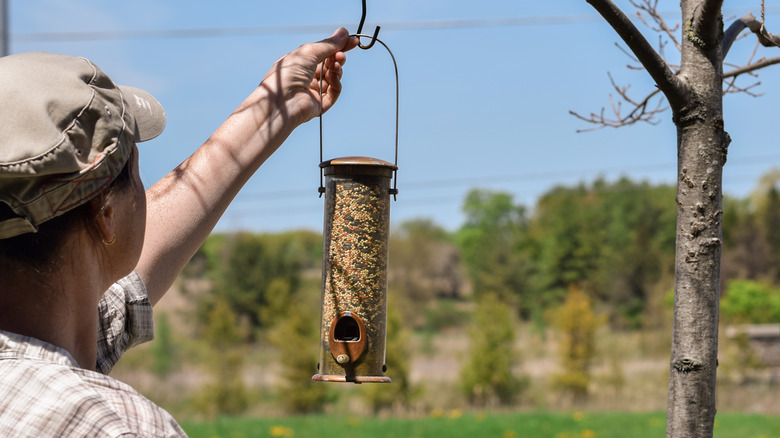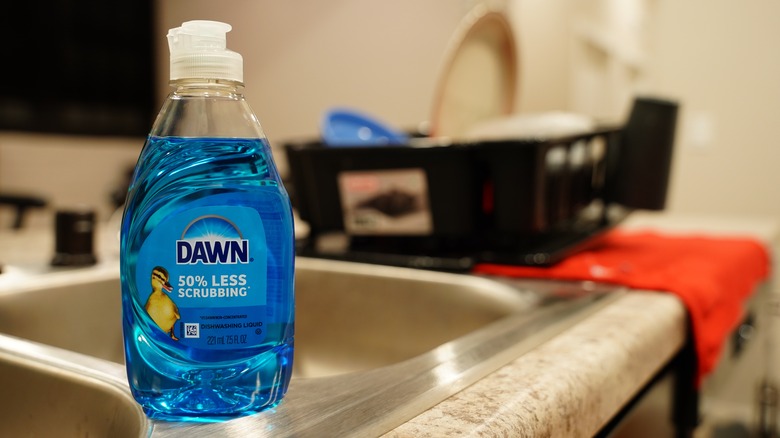Can You Safely Use Soap To Clean Your Bird Feeder?
Bird feeding is a relaxing and rewarding hobby, but if you love attracting birds to your backyard feeder, it's important not to just set it and forget it. Bird feeders can get grimy over time, especially if heavy rains or humid conditions have made the contents sticky, wet, or moldy. Not to mention, birds tend to leave their own messes behind, and nobody wants to eat where they ... well, you know. You might think that birds, being wild animals, won't care about this muck, but a dirty feeder can be unappealing and even dangerous for birds. Wildlife rehabilitation and outreach specialist Sunny Kellner told The Audubon Society, "Regularly emptying and disinfecting feeders is of utmost priority when feeding birds to prevent cross-contamination of many potential illnesses that birds can share at feeders." If you're behind on your feeder chores, you might wonder: is it safe to use soap when cleaning your bird feeders? What about hummingbird feeders?
Birds have incredibly sensitive respiratory tracts, and they can quickly become sick from exposure to the wrong chemicals, fragrances, and other toxins. Luckily, it can be safe to use soap to clean your bird feeder, as long as you reach for the right products. Here's what you need to know about safe soap products to use around wild birds and tips for how to properly clean your backyard bird feeder.
Mild dish soap is safe for birds
If you can effectively clean the bird feeder without soap or other chemicals, using plain hot water is ideal. However, sometimes soap may be necessary to dissolve gunk and ensure a thorough clean for your bird feeder. In this case, it's best to reach for a mild dish soap. Bird rescue organizations and pet bird owners often trust original Dawn dish soap to clean feeders, cages, toys, bowls, and occasionally wild birds themselves. International Bird Rescue writes, "[We have] conducted research on most of the commonly available cleaning agents and Dawn meets all the criteria we have established for appropriate cleaning agents." Any time you use dish soap to clean your bird feeder, you'll need to rinse it very thoroughly in clean water to remove leftover residue.
Some sources also suggest placing your birdfeeder in the dishwasher, but there is some reasonable concern about germs and parasites spreading to human dishware this way. If you plan to use the dishwasher, always wash your bird feeders separately from human dishes and use a hot temperature cycle. You should never load plastic on the dishwasher's bottom rack, so place any plastic pieces on the top rack to avoid melting in the high heat. While this method can provide a powerful clean, dishwasher detergent contains chemicals and enzymes that are stronger than ordinary dish soap, so it's still important to rinse thoroughly after washing to ensure no soap residue remains.
How to clean your bird feeders
Start by knocking as much old seed as you can into the trash, then fill a plastic tub or basin with hot water and add a squirt of Dawn dish soap. Plunge the dirty bird feeder into the suds and soak for a few minutes. Grab a bristled bottle brush or old toothbrush to begin scrubbing away at the gunk until the feeder is clean, then empty out your dirty water. But wait! Sanitizing with diluted bleach is most effective method for reducing harmful bacteria. To sanitize the bird feeder, dilute bleach down to at least 9 parts water to 1 part bleach, soak the feeder, rinse thoroughly, and air dry completely. For a more natural, gentle clean, you can also use 1 part distilled vinegar with 2 parts water. Repeat this every 1-2 weeks.
Hummingbird feeders must be cleaned more frequently than other feeders to keep them safe and sanitary. As you might imagine, the warm sugar water inside is prone to growing bacteria and mold rather quickly, so it's best to clean your hummingbird feeders twice per week using the same steps as above and rinsing extra thoroughly. One of the mistakes everyone makes when cleaning hummingbird feeders is skipping the nozzles, so use cotton swabs to clean out any little straws and nooks where buildup may occur. Opt for glass feeders for easy dishwasher cleaning and have a backup so birds won't go hungry while one feeder is in the wash.

